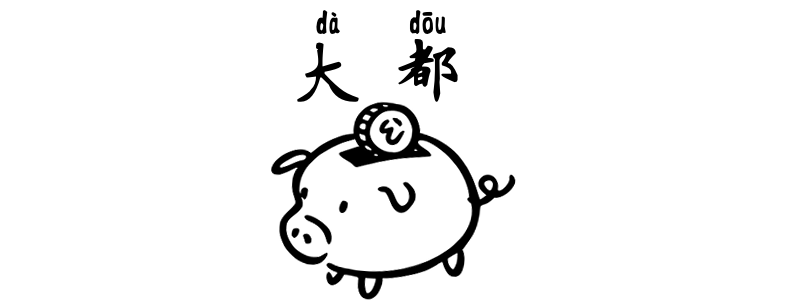Grammar Point:
大都 dàdōu is an adverb in Chinese that means “mostly” or “for the most part.” It is used to describe situations, actions, or characteristics that are true in general but may have exceptions.
Structure
S + 大都 dàdōu + Auxiliary Verb or Verb
他們大都會去參加這次活動他们大都会去参加这次活动
Most of them will attend this event.
你講的話他大都沒在聽你讲的话他大都没在听
He hardly listens to what you say.
這個季節的水果大都很新鮮这个季节的水果大都很新鲜
Most of the fruits in this season are very fresh.
學生們大都已經完成了作業学生们大都已经完成了作业
Most of the students have already finished their homework.
知道這個秘密的人大都已經不存在了知道这个秘密的人大都已经不存在了
Most of the people who knew this secret are no longer here.
天氣好的時候,人們大都會去公園散步天气好的时候,人们大都会去公园散步
When the weather is nice, most people go to the park for a walk.
學中文的人大都是為了中國市場,而不是台灣市場学中文的人大都是为了中国市场,而不是台湾市场 🫠
Most people learn Chinese for the Chinese market, not the Taiwanese one.
所以學生們大都選擇學簡體字、考HSK所以学生们大都选择学简体字,考HSK
That’s why most students choose to learn Simplified Chinese and take the HSK.
Synonyms
大都 dàdōu is more formal and is commonly seen in written or structured spoken language. In casual conversation, phrases like 大部分 dàbùfèn or 多半 duōbàn may be more frequently used.
- 大部分 dàbùfèn: Also means “most” or “the majority of,” but it’s a noun phrase or adjective and usually followed by 的 de.
大部分的台灣人都喜歡吃臭豆腐大部分的台湾人都喜欢吃臭豆腐
Most Taiwanese people like to eat stinky tofu.
家裡大部分的家事都不是我在做家里大部分的家务都不是我在做
Most of the household chores at home are not done by me.
- 多半 duōbàn: Can be used similarly to 大都 dàdōu, meaning “most likely” or “mostly,” but is often associated with conjecture or probability.
雖然他父母都是台灣人,但是他在家多半說英語,所以中文不太好虽然他父母都是台湾人,但是他在家多半说英语,所以中文不太好
Although his parents are both Taiwanese, he mostly speaks English at home, so his Chinese isn’t very good.
他到現在還沒出現,多半是睡過頭了他到现在还没出现,多半是睡过头了
He hasn’t shown up yet, most likely because he overslept.


